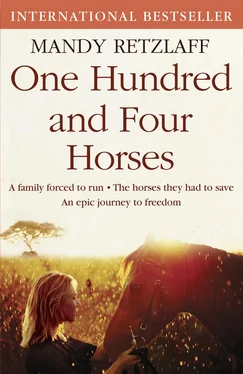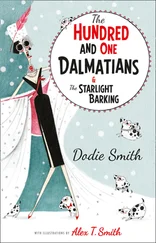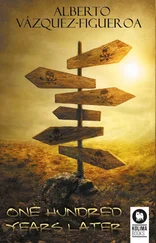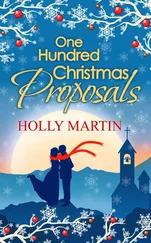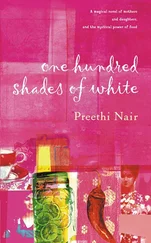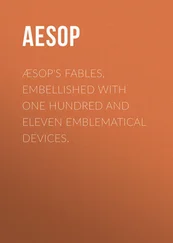I remembered standing in this same place only days after we came to Crofton, watching as Paul and Jay swung from the same branches. That day, Kate stood beneath, marveling at her brothers, forbidden herself from following. Now she could climb faster and higher than they ever would. That was the thing about Kate: she saw what braveries her brothers could accomplish, and she always went one better.
In the highest branches, she stopped dead. Then, from the corner of Crofton, came Jay and his friend Henry, the son of a neighboring farmer. Both of them were holding their pellet guns.
In a sudden scramble of limbs, Kate jumped down from the tree just as Jay and Henry were disappearing into the first fringe of the bush. Quickly, she made to follow.
From the kitchen window, I watched her go. Jay, I knew, was going to be furious. I had seen her do this before. Jay and his friend were going to take potshots at birds in the bush, but it distressed Kate so much that she simply had to do something about it. Rather than run and hide, she had taken to sabotaging their hunts by frightening off the birds they were stalking. She would clap her hands and sing loud songs—and it had been a long time since Jay had proudly brought back a feathery carcass to Crofton farmhouse.
Kate followed him from deepest gully to highest ridge, along winding game trails and farm tracks, down to the tall reeds on the shores of Two Tree Hill Dam and up along the rivers that held our home in their cradle. With every step that she took, she clapped her hands wildly, oblivious to her brother’s orders, his threats, his pleading looks. Every time she clapped her hands, the birds on which Jay had trained his pellet gun took off, a chaos of flapping wings and cries of alarm.
In this way, Jay was deprived time and again of his kills. At dusk, he tramped back into Crofton, dejected, his pellet gun still full. When he threw it down in disgust, Kate clapped again.
“Don’t worry, Jay. If Dad found you, you know what you’d have to do …”
Jay had been under strict orders ever since he unwrapped his prized pellet gun that he could shoot a bird only if he planned to eat it.
Jay looked at Kate.
“You’re just jealous,” he said, “that you can’t shoot, too.”
But when they lined up tin cans in the garden and took potshots at them, Kate won every time.
She took after her mother, you see.
In later years, Frisky began to wither. Pat had never known her true age, but the lines deepened in her face, she lost weight that she would never regain, and when she and Pat set out across the farm, driving what few cattle we had left into their crush for dipping or simply reliving the days of their youth, she lived up to her name less and less often. No longer was she frisky; now, she was stately, quiet, reserved. A gentle horse in her dotage, slowly winding down.
In 1998, she left the paddocks and moved into our garden. She liked to lie down on the grass, and Kate nestled contentedly between her legs, our daughter and our horse breathing in unison. She ate from our hands but was hidden away when guests came to Crofton. She was too old, now, skin and bones. Questions were asked when those who did not know her laid eyes on her: Wouldn’t her passing, they wondered, be considered a kindness?
It would not be the first time Pat had lifted his gun to shoot an old friend. Children on farms learn, very early on, that death is a part of life. Livestock are culled, poachers’ dogs are shot, horses with tumors and disease might need their master’s mercy. But, every evening, Pat went into our garden to put his arms around his oldest friend, and I knew he would not, could not do it. Frisky just grew older and older. Neither one of them would let go.
Pat was away from the farm on business when I stood in the kitchen window and saw Frisky lying in the shadow of the mango tree, her chest barely rising or falling. I left what I was doing and went out to see her. Kate and Jay followed, but instinctively they knew and hung at a distance. For the briefest moment, Frisky lifted her head, eyes rolling as if to search Pat out; then she laid her head down, and the only movement was the twitching of her nostrils. I sat with her for hours, her head in my lap, teasing her ears, whispering to her. I knew there was no coming back; her time had come. Her breathing grew low and ragged. It slowed. Then it was no more.
Kate and Jay sat with her for the longest time, but Pat would not be back until after dark. I was putting Kate to bed when I heard the telltale stutter of an engine that told me he had returned. I left Kate half tucked-in and went to meet him as he climbed out of the car.
Hanging above us, in a frame of lantern light, Kate watched from behind the bedroom curtains. Perhaps she had that old childhood terror of seeing your parents crumple, revealing themselves as mere mortals. She was watching, but she did not want to see.
I told Pat that Frisky was gone and he did not breathe a word.
When he went to her, Oliver and some of the other workers were trying to lift her from where she had lain. One by one, Pat waved them away. And then, almost thirty years after she first came cantering into his life, Pat knelt down beside her and put his arms around her for the final time.
He did not come to bed until late that night. He laid Frisky in the ground himself, gave her to Crofton. It is what she would have wanted.
The morning after Frisky left us, I woke early to find that the bed beside me was empty. Reeling downstairs and out into the morning sun, I saw Pat and Kate tending to Deja-vous at the bottom of the garden. Her leg was healed now, and Kate led her gently up and down on a lead rope. Her dark eyes glimmered.
I went to Pat and put my hand in his.
“Are you okay?” I asked.
It is a terrible thing to lose a beloved horse. Pat had known Frisky longer than I had known him. They had grown together, changed together. She had taught him to ride, and she taught our children, too. And, as we rode out onto the farm that day, I had the inalienable feeling that she was still there, cantering alongside us. She would be here forever. She was part of Crofton now.
In a way, I felt as if Frisky had entrusted Pat to me. I would be with him for the rest of his life, while Frisky cantered on alone.
I did not mean to let her down.
Chapter 3 Contents Cover Title Page One Hundred and Four Horses A family forced to run The horses they had to save An epic journey to freedom MANDY RETZLAFF Copyright William Collins An imprint of HarperCollins Publishers 77–85 Fulham Palace Road London W6 8JB www.harpercollins.co.uk First published in Great Britain by William Collins in 2013 Text © 104 Horses Ltd, 2013 The author asserts her moral right to be identified as the author of this work. Cover photographs (posed by a model) © Lara Wernet/NA/Novarc/Corbis (woman and horse); Panoramic Images/Getty Images (tree). A catalogue record for this book is available from the British Library. All rights reserved under International and Pan-American Copyright Conventions. By payment of the required fees, you have been granted the non-exclusive, non-transferable right to access and read the text of this ebook on-screen. No part of this text may be reproduced, transmitted, down-loaded, decompiled, reverse engineered, or stored in or introduced into any information storage and retrieval system, in any form or by any means, whether electronic or mechanical, now known or hereinafter invented, without the express written permission of HarperCollins. The author asserts the moral right to be identified as the author of this work. Find out more about HarperCollins and the environment at www.harpercollins.co.uk/green Source ISBN: 9780007477555 Ebook Edition © AUGUST 2013 ISBN: 9780007477579 Version: 2014-08-22 Dedication This book is dedicated to all our beautiful horses, and especially to those no longer with us— may their spirits run free . Epigraph Set a beggar on horseback, and he’ll outride the devil. —GERMAN PROVERB Prologue Ten Years Earlier Chapter 1 Chapter 2 Chapter 3 Chapter 4 Chapter 5 Chapter 6 Chapter 7 Chapter 8 Chapter 9 Chapter 10 Chapter 11 Mozambique Chapter 12 Chapter 13 Chapter 14 Chapter 15 Epilogue Picture Sections About the Publisher
Читать дальше
